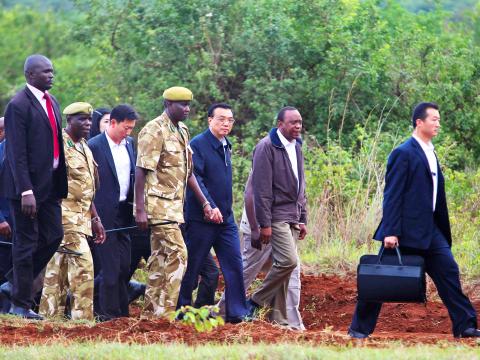East African leaders and China yesterday formally signed agreements for the construction of a new multibillion-dollar railway linking the Kenyan port of Mombasa to Nairobi and running on to neighboring states.
The deals were signed in Nairobi on the last stage of an Africa tour by Chinese Premier Li Keqiang (李克強), although Kenyan President Uhuru Kenyatta had already signed up to the deal during his state visit to Beijing last year.
“The costs of moving our people and our goods ... across our borders will fall sharply,” Kenyatta told a news conference with the Chinese and African leaders yesterday.

Photo: EPA
The new standard gauge line will supplement a slower narrow gauge network that now only runs to Uganda, whereas the new line is designed to go on to Rwanda and South Sudan, part of an effort to cut the hefty costs of trade between east African nations, which mainly rely on poor roads and the rickety narrow gauge line built in the 19th century.
Kenyatta has previously said the new railway will cut freight costs to US$0.08 a tonne per kilometer from US$0.20 now.
China Road and Bridge Corp, a subsidiary of China Communications Construction Co, has been appointed to construct the initial Kenyan leg of the line, despite widespread criticism that there was no competitive tendering for the work.
Kenyan officials said there was no public bidding because that was a condition of securing Chinese financing, but some lawmakers said the deal was overpriced.
Officials previously put the price for the railway from Mombasa to Kenya’s western border with Uganda at 447.5 billion shillings (US$5 billion), including financing costs.
China has won friends in Africa by building infrastructure across the continent, but critics grumble that it often relies on Chinese labor and is more keen on sucking in African raw materials than passing on skills.
Li told the news conference yesterday that the rail construction company would ensure African workers were trained and laws adhered to.
Meanwhile Kenya signed two financing deals on Saturday with China’s Eximbank, although no value was given.
Officials previously said China was offering a US$1.6 billion commercial loan and a US$1.63 billion concessional facility for the Mombasa to Nairobi section — covering 85 percent of that section’s estimated US$3.8 billion cost.

The CIA has a message for Chinese government officials worried about their place in Chinese President Xi Jinping’s (習近平) government: Come work with us. The agency released two Mandarin-language videos on social media on Thursday inviting disgruntled officials to contact the CIA. The recruitment videos posted on YouTube and X racked up more than 5 million views combined in their first day. The outreach comes as CIA Director John Ratcliffe has vowed to boost the agency’s use of intelligence from human sources and its focus on China, which has recently targeted US officials with its own espionage operations. The videos are “aimed at

STEADFAST FRIEND: The bills encourage increased Taiwan-US engagement and address China’s distortion of UN Resolution 2758 to isolate Taiwan internationally The Presidential Office yesterday thanked the US House of Representatives for unanimously passing two Taiwan-related bills highlighting its solid support for Taiwan’s democracy and global participation, and for deepening bilateral relations. One of the bills, the Taiwan Assurance Implementation Act, requires the US Department of State to periodically review its guidelines for engagement with Taiwan, and report to the US Congress on the guidelines and plans to lift self-imposed limitations on US-Taiwan engagement. The other bill is the Taiwan International Solidarity Act, which clarifies that UN Resolution 2758 does not address the issue of the representation of Taiwan or its people in

US Indo-Pacific Commander Admiral Samuel Paparo on Friday expressed concern over the rate at which China is diversifying its military exercises, the Financial Times (FT) reported on Saturday. “The rates of change on the depth and breadth of their exercises is the one non-linear effect that I’ve seen in the last year that wakes me up at night or keeps me up at night,” Paparo was quoted by FT as saying while attending the annual Sedona Forum at the McCain Institute in Arizona. Paparo also expressed concern over the speed with which China was expanding its military. While the US

SHIFT: Taiwan’s better-than-expected first-quarter GDP and signs of weakness in the US have driven global capital back to emerging markets, the central bank head said The central bank yesterday blamed market speculation for the steep rise in the local currency, and urged exporters and financial institutions to stay calm and stop panic sell-offs to avoid hurting their own profitability. The nation’s top monetary policymaker said that it would step in, if necessary, to maintain order and stability in the foreign exchange market. The remarks came as the NT dollar yesterday closed up NT$0.919 to NT$30.145 against the US dollar in Taipei trading, after rising as high as NT$29.59 in intraday trading. The local currency has surged 5.85 percent against the greenback over the past two sessions, central